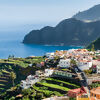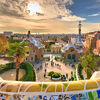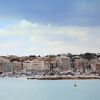30 Nights | Europe
About Civitavecchia, Italy
You will visit the following 20 places:

Tenerife
Tenerife is the largest and most populated island of the seven Canary Islands; it is also the most populated island of Spain. Tenerife is also the largest and most populous island of Macaronesia. About five million tourists visit Tenerife each year, the most of any of the Canary Islands. It is also one of the most important tourist destinations in Spain and the world. Tenerife hosts one of the world's largest carnivals and the Carnival of Santa Cruz de Tenerife is attempting to become a World Heritage Site. The island is home to the University of La Laguna, which was founded in 1792 and is the oldest university in the Canaries. San Cristóbal de La Laguna (a World Heritage Site) is the second city of the island and the third one of the archipelago. The city of La Laguna was also capital of the Canary Islands until Santa Cruz replaced it in 1833. In the Teide National Park (World Heritage Site), in the center of the island, is the highest elevation of Spain as well as the highest of the islands of the Atlantic Ocean, and the third largest volcano in the world from its base, Teide. Also located on the island Macizo de Anaga since 2015 is Biosphere Reserve and is the place that has the largest number of endemic species in Europe. The island's capital contains the architectural symbol of the Canary Islands, the modern Auditorio de Tenerife.

Casablanca
Casablanca is a city in western Morocco, located on the Atlantic Ocean. It is the capital of the Grand Casablanca region. With a population of 3,299,428, Casablanca is Morocco's largest city as well as its chief port. It's also the biggest city in the Maghreb. Casablanca is considered the economic and business center of Morocco, while the political capital city of Morocco is Rabat.

Agadir
Agadir is a major city in southwest Morocco, capital of the Agadir province and the Sous-Massa-Draa economic region. The city is located on the shore of the Atlantic Ocean, near the foot of the Atlas Mountains, just north of the point where the Souss River flows into the ocean. A resort destination, it's known for its golf courses, wide crescent beach and seaside promenade lined with cafes, restaurants and bars.

Naples
Naples is a city in Italy; it is the capital of the region of Campania and of the province of Naples. Known for its rich history, art, culture, architecture, music, and gastronomy, Naples has played an important role in the Italian peninsula and beyond for much of its existence, which began more than 2,800 years ago. Situated on the west coast of Italy by the Gulf of Naples, the city is located halfway between two volcanic areas, Mount Vesuvius and the Phlegraean Fields. Naples has the fourth-largest urban economy in Italy, after Milan, Rome and Turin. It is the world's 103rd-richest city by purchasing power, with an estimated 2011 GDP of US$83.6 billion. The port of Naples is one of the most important in Europe, and has the world's second-highest level of passenger flow, after the port of Hong Kong. The city has long been a major cultural centre with a global sphere of influence, particularly during the Renaissance and Enlightenment eras. In the immediate vicinity of Naples are numerous culturally and historically significant sites, including the Palace of Caserta and the Roman ruins ofPompeii and Herculaneum. Culinarily, it is synonymous with pizza, which originated in the city.

Alghero

Lisbon
The capital of Portugal, Lisbon (Portuguese: Lisboa) has experienced a renaissance in recent years, with a contemporary culture that is alive and thriving and making its mark in today's Europe. Perched on the edge of the Atlantic Ocean, Lisbon is one of the rare Western European cities that faces the ocean and uses water as an element that defines the city. Lisbon enchants travellers with its white-bleached limestone buildings, intimate alleyways, and an easy-going charm that makes it a popular year-round destination.

Funchal
Funchal is the largest city, the municipal seat and the capital of Portugal's Autonomous Region of Madeira. The city has a population of 111,892, making it the 6th largest city in Portugal, and has been the capital of Madeira for more than five centuries. Because of its high cultural and historical value, Funchal is one of Portugal's main tourist attractions. It is also popular as a destination for New Year's Eve, and it is the leading Portuguese port on cruise liner dockings.

Tangier
Tangier or Tangiers is a city in northern Morocco. It lies on the North African coast at the western entrance to the Strait of Gibraltar where the Mediterranean meets the Atlantic Ocean off Cape Spartel. It is the capital of the Tangier-Tétouan Region and of the Tangier-Assilah Prefecture within that region. The history of Tangier is very rich due to the historical presence of many civilizations and cultures starting from the 5th century BC.

Lanzarote
Lanzarote, a Spanish island, is the easternmost of the autonomous Canary Islands, in the Atlantic Ocean. Covering 845.94 square kilometers (327 sq mi), it is the fourth largest of the islands in the archipelago. With 141,938 inhabitants, Lanzarote is the third most populous island of the Canary Islands, after Tenerife and Gran Canaria. In the center-west of the island is the Timanfaya National Park, which is one of the main attractions of Lanzarote. Its capital is Arrecife.

Barcelona
Barcelona – Spain's enchanting capital, second largest and most populous city. It is a huge city that vibrates with life, and there’s certainly not another city in the country to touch it for its sheer style, looks or energy. It is one of the world's leading tourist, economic, trade fair and cultural centers, and its influence in commerce, education, entertainment, media, fashion, science, and the arts all contribute to its status as one of the world's major global cities. Barcelona is home to masterpieces of many great architects – the most famous of which is Antoni Gaudí.

Fort Lauderdale
Fort Lauderdale is a city in the U.S. state of Florida, 28 miles (45 km) north of Miami. The city is a popular tourist destination, with an average year-round temperature of 75.5 °F (24.2 °C), and 3,000 hours of sunshine per year. Greater Fort Lauderdale which takes in all of Broward County hosted 12 million visitors in 2012, including 2.8 million international visitors. The district has 561 hotels and motels comprising nearly 35,000 rooms. Greater Fort Lauderdale has over 4,000 restaurants, 63 golf courses, 12 shopping malls, 16 museums, 132 nightclubs, 278 parkland campsites, and 100 marinas housing 45,000 resident yachts. Fort Lauderdale is named after a series of forts built by the United States during the Second Seminole War. The forts took their name from Major William Lauderdale (1782–1838), younger brother of Lieutenant Colonel James Lauderdale. William Lauderdale was the commander of the detachment of soldiers who built the first fort.

Porto

La Palma Island
La Palma, also San Miguel de La Palma, is the most north-westerly island of the Canary Islands,Spain. La Palma has an area of 706 km2 making it the fifth largest of the seven main Canary Islands. La Palma, like the other islands of the Canary Island archipelago, is also a volcanic ocean island. It is truly an idyllic spot with numerous ecological treasures.

Cadiz

Cartagena
Cartagena is a Spanish city and a majornaval station located in the Region of Murcia, by the Mediterranean coast, south-eastern Spain. The metropolitan area of Cartagena, known as Campo de Cartagena, has a population of 409,586 inhabitants. Cartagena has been inhabited for over two millennia, being founded around 227 BC by the Carthaginian Hasdrubal the Fair as Qart Hadasht, the same name as the original city of Carthage. Much of the historical weight of Cartagena in the past goes to its coveted defensive port, one of the most important in the western Mediterranean. As far back as the 16th century it was one of the most important naval ports in Spain, together with Ferrol in the North. It is still an important naval seaport, the main military haven of Spain, and is home to a large naval shipyard. The confluence of civilizations as well as its strategic harbour, together with the rise of the local mining industry is manifested by a unique artistic heritage, with a number of landmarks such as the Roman Theatre, the second largest of the Iberian Peninsulaafter the one in Mérida, an abundance of Phoenician, Roman, Byzantine and Moorish remains, and a plethora of Art Nouveaubuildings, a result of the bourgeoisie from the early 20th century. Cartagena is now established as a major cruise ship destination in the Mediterranean and an emerging cultural focus. It is the first of a number of cities that eventually have been named Cartagena, most notably Cartagena de Indias (Cartagena of the Indies) in Colombia.

Civitavecchia
Civitavecchia is a town and comune of the Metropolitan City of Rome in the central Italian region of Lazio. A sea port on the Tyrrhenian Sea, the name ''Civitavecchia'' means "ancient town". The modern city was built over a pre-existing Etruscan settlement. The massive Forte Michelangelo was first commissioned from Donato Bramante by Pope Julius II, to defend the port of Rome. The upper part of the "maschio" tower, however, was designed by Michelangelo, whose name is generally applied to the fortress. North of the city at Ficoncella are the Terme Taurine baths frequented by Romans and still popular with the Civitavecchiesi. The modern name stems from the common fig plants among the various pools. And also next to the town is the location of the cruise ship docks. All major cruise lines start and end their cruises at this location, and others stop for shore excursion days that allow guests to see Rome and Vatican sights, which are ninety minutes away.

Ajaccio

Portimão

Ceuta











